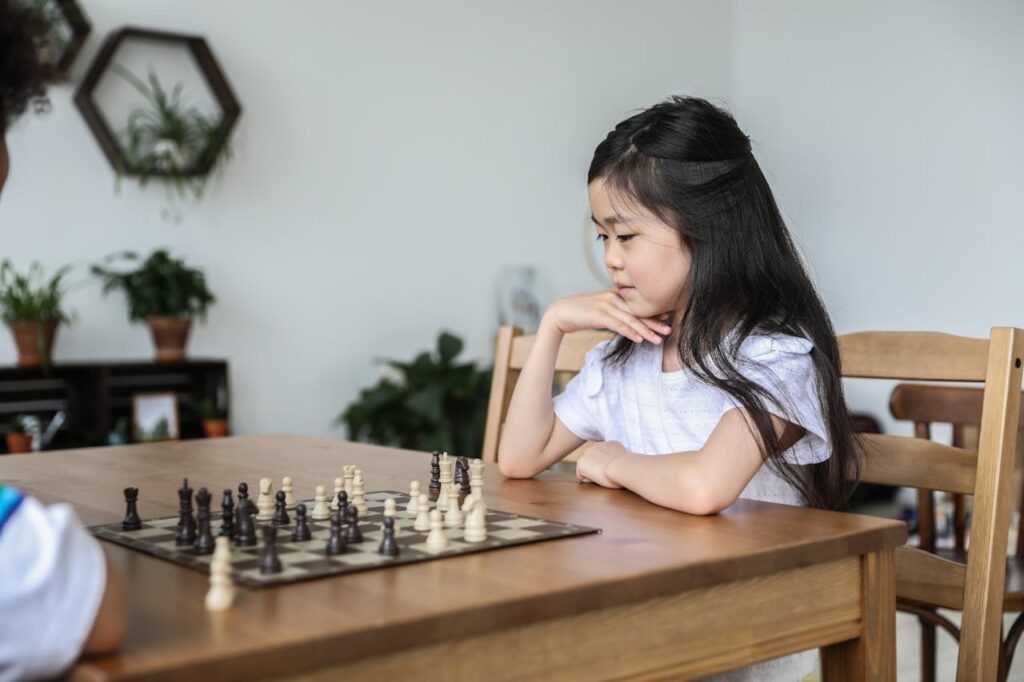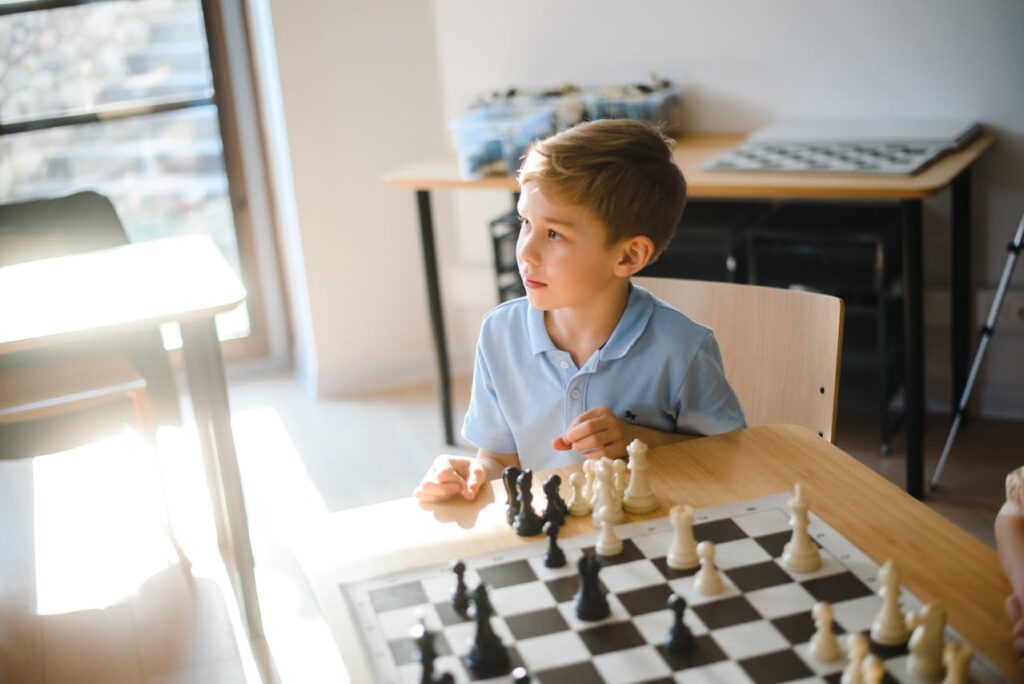In today’s fast-paced world, helping your child develop a strong memory is more important than ever. A good memory is the foundation of learning, whether it’s mastering new vocabulary, understanding math concepts, or recalling historical facts. But how can you effectively boost your child’s memory? One surprisingly powerful tool is chess.
Chess is more than just a game; it’s a mental workout that engages your child’s brain in ways that few other activities can. By playing chess, children practice critical thinking, problem-solving, and most importantly, memory. From remembering complex strategies to recalling previous games, chess exercises the brain and enhances memory skills in a fun, engaging way.
The Role of Memory in Chess
Before we explore how chess boosts your child’s memory, it’s important to understand the role memory plays in the game.
Chess is a game of strategy, and success often depends on a player’s ability to remember previous games, recognize patterns, and recall the movements of various pieces.
Working Memory
Working memory is the ability to hold and manipulate information in the mind over short periods. In chess, working memory is constantly in use.
Players must remember the positions of all the pieces on the board, consider possible future moves, and keep track of the opponent’s potential strategies.
This requires the player to juggle multiple pieces of information at once, all while planning their own moves.
For children, developing a strong working memory is crucial. It helps them follow instructions, solve problems, and stay focused on tasks.
By playing chess, children repeatedly exercise their working memory, which helps strengthen this vital cognitive skill.
The more they play, the better they become at holding and processing information in their minds—a skill that will serve them well in school and beyond.
Long-Term Memory
Long-term memory is essential in chess because it allows players to remember patterns, strategies, and even entire games.
Experienced chess players often rely on their long-term memory to recognize familiar positions and draw on strategies they’ve learned in the past.
For example, knowing how to execute a specific opening or endgame strategy requires recalling information stored in long-term memory.
When children play chess regularly, they build a vast storehouse of knowledge in their long-term memory.
They begin to recognize common patterns and positions, and over time, they can recall these strategies without much effort.
This ability to remember and apply learned strategies from one game to the next is a key factor in improving at chess and is a testament to the power of long-term memory.
Pattern Recognition
Pattern recognition is a vital component of memory in chess. Successful chess players are those who can quickly recognize patterns on the board and anticipate their opponent’s moves.
This ability to see and remember patterns is a skill that develops over time, with practice and experience.
For children, developing strong pattern recognition skills through chess has numerous benefits.
It not only helps them become better chess players but also enhances their ability to recognize patterns in other areas of life, such as in math, reading, and problem-solving.

For example, recognizing patterns in numbers is crucial for mastering multiplication tables, while recognizing patterns in stories can help with reading comprehension.
Visual-Spatial Memory
Visual-spatial memory refers to the ability to remember and visualize spatial relationships between objects.
In chess, players use visual-spatial memory to remember the positions of pieces on the board and to anticipate how these positions will change as the game progresses.
For children, developing strong visual-spatial memory is important for tasks such as reading maps, solving puzzles, and even understanding math problems that involve geometry.
Chess challenges the brain to remember and manipulate the positions of pieces in space, which enhances visual-spatial memory and helps children perform better in tasks that require this skill.
How Chess Benefits Academic Performance
The memory skills developed through chess have a direct impact on academic performance.
By enhancing working memory, long-term memory, pattern recognition, and visual-spatial memory, chess helps children excel in a variety of subjects at school.
Improving Math Skills
Math and chess share many similarities, particularly in the way they both rely on logical thinking, pattern recognition, and problem-solving.
Chess helps children develop the mental discipline needed to tackle complex mathematical problems, as well as the memory skills required to recall formulas and strategies.
For example, in math, students often need to remember and apply formulas to solve problems.
Chess reinforces this skill by requiring players to remember specific strategies and apply them in different situations.
The practice of recalling and using learned information in chess strengthens the same memory pathways that are used in math.
Enhancing Reading Comprehension
Reading comprehension requires strong working memory, as readers must remember details from earlier in the text while processing new information.
Chess helps strengthen this type of memory by training children to hold multiple pieces of information in their minds while considering the next move.
For instance, when reading a story, a child needs to remember characters, settings, and events to fully understand the plot.
Similarly, in chess, a player must remember the positions of pieces, previous moves, and potential threats to make informed decisions.
The mental juggling act required in chess mirrors the cognitive demands of reading comprehension, making chess an excellent way to improve this skill.
Strengthening Memory for Science and History
Science and history are subjects that often require students to memorize a large amount of information, such as scientific principles, historical dates, and key figures.
The long-term memory skills developed through chess can make it easier for children to retain and recall this information.
For example, understanding the laws of physics or the details of a historical event requires students to remember and connect different pieces of information.
Chess players who are practiced in remembering strategies and game outcomes are better equipped to remember and connect facts in science and history.
Boosting Overall Cognitive Development
Beyond individual subjects, the memory skills developed through chess contribute to overall cognitive development.
Chess challenges the brain in ways that few other activities do, providing a comprehensive workout for the mind.
This mental exercise strengthens neural connections, improves cognitive flexibility, and enhances the brain’s ability to process and retain information.
As a result, children who play chess regularly often show improved academic performance across the board.
They are better able to focus, remember information, and apply what they’ve learned in different contexts. This cognitive boost helps them excel in school and sets the stage for lifelong learning and success.
Practical Tips for Using Chess to Boost Your Child’s Memory
Now that we’ve explored how chess strengthens various types of memory and enhances academic performance, let’s look at some practical ways you can use chess to help boost your child’s memory.
Whether your child is new to chess or already enjoys playing, these tips can make chess a more effective and enjoyable tool for memory development.
Start with Short, Regular Sessions
When introducing your child to chess, it’s important to start with short, regular sessions. Consistency is key when it comes to building memory skills.
Instead of long, infrequent games, aim for shorter, more frequent sessions. This allows your child to practice recalling information and applying strategies without feeling overwhelmed.
For younger children or beginners, even 10 to 15 minutes a day can make a significant difference. As your child becomes more comfortable with the game, you can gradually increase the length of the sessions.
The goal is to make chess a regular part of their routine, which will help reinforce the memory skills they are developing.
These short sessions also help maintain your child’s interest and focus. By keeping the games brief and enjoyable, you ensure that your child looks forward to playing chess, rather than seeing it as a chore.
This positive attitude towards chess will encourage them to keep practicing, further strengthening their memory over time.

Encourage the Use of Chess Puzzles
Chess puzzles are an excellent way to sharpen your child’s memory while also improving their problem-solving skills.
Chess puzzles typically present a specific scenario, such as setting up a checkmate in one or two moves, and challenge the player to find the solution.
These puzzles require players to remember various strategies and apply them to the problem at hand.
Incorporating chess puzzles into your child’s practice routine helps them focus on specific aspects of the game, such as recognizing patterns or recalling tactical sequences.
Over time, this targeted practice strengthens both working memory and long-term memory, making it easier for your child to remember and apply chess strategies during actual games.
You can find chess puzzle books or online resources with puzzles tailored to different skill levels. Start with simpler puzzles to build your child’s confidence, and gradually introduce more complex challenges as they improve.
Review and Analyze Games Together
One of the most effective ways to enhance memory through chess is by reviewing and analyzing games after they’ve been played.
This practice encourages your child to recall the moves they made, think about their strategy, and identify any mistakes or missed opportunities.
After each game, sit down with your child and go over the moves together. Ask questions like, “What was your plan when you made this move?” or “Can you remember why you decided to move this piece?”
This discussion helps your child reflect on their thinking process and reinforces the memory of specific strategies and patterns.
Analyzing games also helps your child learn from their mistakes. By revisiting the game, they can see where they went wrong and think about how they can improve in the future.
This process of reflection and learning strengthens long-term memory and encourages a growth mindset, where your child views mistakes as opportunities for growth.
Use Mnemonics and Memory Aids
Mnemonics and memory aids are powerful tools for helping your child remember complex information, such as the movements of different pieces or specific chess strategies.
Mnemonics are memory techniques that use patterns, acronyms, or visual images to make information easier to recall.
For example, to help your child remember how the knight moves, you might use the phrase “L for Leap” to remind them that the knight moves in an L-shape.
For the bishop, you could use “B for Bishop, B for Both diagonals” to emphasize that the bishop moves diagonally in both directions.
You can also create visual aids, such as flashcards with images of chess pieces and arrows showing their movement patterns.
Reviewing these cards regularly helps reinforce your child’s memory of the rules and makes it easier for them to recall the information during a game.
Make Chess a Social Activity
Playing chess with others, whether it’s family members, friends, or classmates, adds a social dimension to the game that can further enhance memory development.
Social interactions stimulate the brain in unique ways, encouraging your child to think more critically and remember more effectively.
Organizing regular chess games with family or joining a local chess club can provide your child with the opportunity to play against different opponents, which challenges them to adapt and remember various strategies.
The social aspect of these interactions makes the game more enjoyable and motivates your child to keep improving.
Additionally, discussing chess strategies and moves with others reinforces memory by encouraging your child to articulate their thought process.
Explaining their decisions and recalling previous games during conversations helps solidify the information in their memory, making it easier to retrieve during future games.
Integrate Chess with Other Learning Activities
Chess doesn’t have to be a standalone activity; it can be integrated with other learning activities to create a richer, more engaging experience.
For example, if your child is learning about history, you can explore the origins of chess and its cultural significance in different societies.
This integration helps reinforce both historical knowledge and chess strategies, making it easier for your child to remember both.

You can also connect chess with math by exploring the mathematical patterns and principles that underlie the game.
For example, discussing the geometry of the chessboard or the probabilities involved in certain moves helps your child see the connections between chess and math, which strengthens their understanding and memory of both subjects.
The Long-Term Benefits of Chess for Memory
The memory-boosting benefits of chess extend far beyond the immediate improvements in academic performance.
Chess helps lay the foundation for lifelong cognitive health, equipping your child with skills and habits that will benefit them throughout their lives.
Building a Strong Foundation for Learning
The memory skills developed through chess provide a strong foundation for all future learning.
As your child strengthens their working memory, long-term memory, and pattern recognition skills, they become better equipped to handle the demands of higher education and beyond.
These memory skills are not only essential for academic success but also for professional success.
Whether it’s remembering important details in a business meeting or recalling technical information in a scientific field, the ability to quickly and accurately retrieve information is a valuable asset in any career.
By starting early and incorporating chess into your child’s routine, you help them develop the cognitive tools they need to succeed in school, work, and life.
Promoting Cognitive Health in Adulthood
Chess is a lifelong game that continues to challenge and stimulate the brain well into adulthood.
The cognitive benefits of playing chess, including improved memory, have been shown to help protect against age-related cognitive decline.
By keeping the brain active and engaged, chess helps maintain mental sharpness and cognitive function as we age.
For your child, developing a love for chess at a young age can set the stage for a lifetime of cognitive health.
As they grow older, the mental discipline and memory skills they developed through chess will continue to benefit them, helping to keep their minds sharp and agile.
Fostering a Love for Lifelong Learning
One of the most important benefits of chess is that it fosters a love for learning. Chess teaches children that learning is a continuous process, where there is always more to discover, explore, and master.
This attitude of curiosity and persistence is essential for lifelong learning and personal growth.
By integrating chess into your child’s routine, you help them develop a passion for learning that goes beyond the classroom.
Chess encourages them to think critically, explore new strategies, and constantly challenge themselves. This love for learning will stay with them throughout their lives, motivating them to seek out new knowledge and experiences.
Conclusion
Chess is a powerful tool for boosting your child’s memory and enhancing their cognitive development.
By strengthening working memory, long-term memory, pattern recognition, and visual-spatial memory, chess helps children excel in school and equips them with the skills they need for lifelong success.
Whether your child is just starting out or already enjoys playing chess, integrating this game into their routine can have profound benefits for their memory and overall cognitive health.
With regular practice, the skills they develop through chess will serve them well in all areas of life, from academic achievement to professional success.
